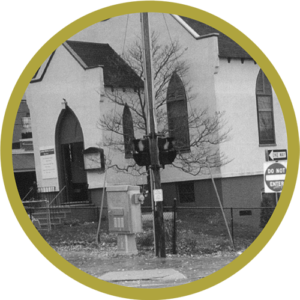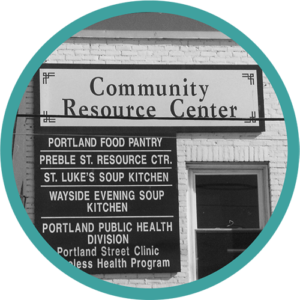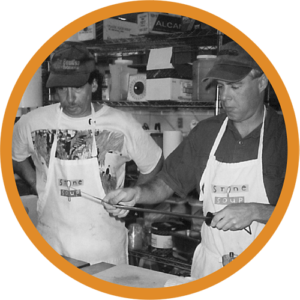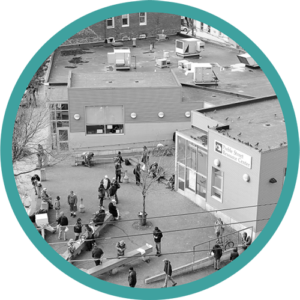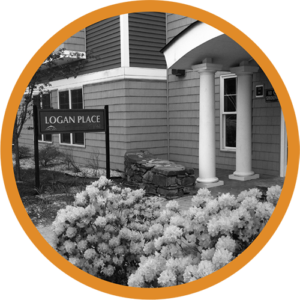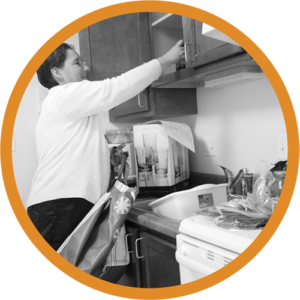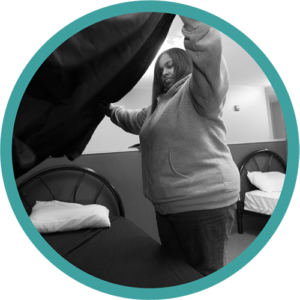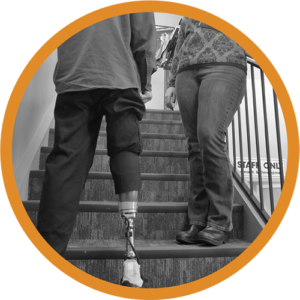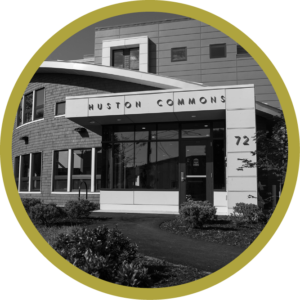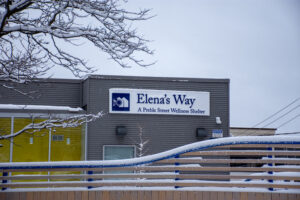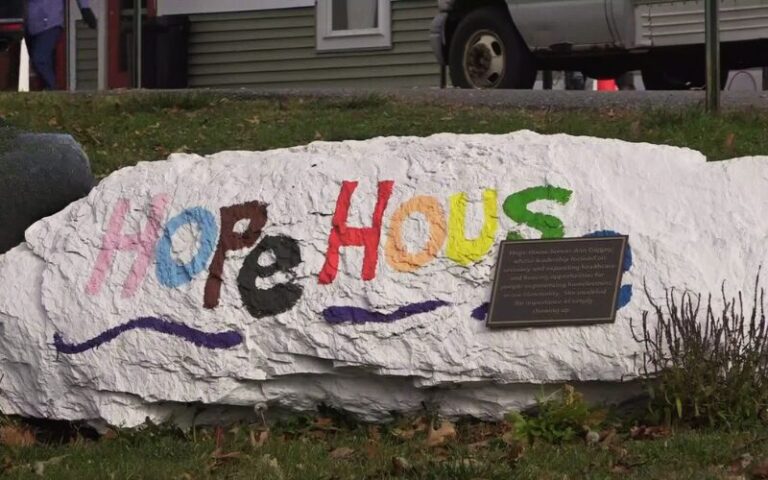In 1975, Preble Street was founded as a neighborhood center in Portland to involve and empower homeless and low-income residents. Today, Preble Street is a statewide hub of services and compassion for the most vulnerable and underserved people across the state of Maine. The timeline below displays just some of the key dates and events that have shaped the organization.
-
1975
AGENCY FOUNDED
Preble Street began as the High Street Resource Center, a neighborhood center that empowered residents experiencing poverty and homelessness. Founder Joe Kreisler started the agency as a real world training ground for his students at the University of Southern Maine School of Social Work and a place for Portland’s most vulnerable residents to get help meeting their goals.
-
1981
AGENCY BECOMES PREBLE STREET RESOURCE CENTER
After moving to the basement of the Preble Street Chapel, the agency was renamed the Preble Street Resource Center (PSRC). Recognizing that people experiencing homelessness need a safe place to stay during the day, Preble Street was the first agency in Maine to provide a day shelter. Clients at the PSRC received free meals, case management, and access to healthcare, employment counseling, clothing, bathrooms, mail, laundry, and more.
-
1985
FIRST FULL-TIME SOCIAL WORKER HIRED.
Previously staffed solely by student interns and volunteers, Preble Street expanded its casework services with the addition of a full-time social worker.
-
1987
PORTLAND CITY OFFICIALS PROMISE TO PROVIDE EMERGENCY SHELTER
Following a successful “tent city” protest led by Preble Street, consumer advocates, and national homeless services leaders, the City of Portland committed to sheltering people experiencing homelessness.
-
1993
PREBLE STREET RESOURCE CENTER MOVES
5 Portland Street became the new home of the PSRC, which expanded its hours and services, and consolidated Portland's scattered meal programs to one location at the PSRC Soup Kitchen.
-
1995
HOMELESS VOICES FOR JUSTICE FOUNDED
Initially known as the Consumer Advocacy Project, Homeless Voices for Justice (HVJ) was created as a statewide, grassroots, social change movement, organized and led by people who have struggled with homelessness, hunger, and poverty.
-
1996
PREBLE STREET OPENS TEEN CENTER
Replicating the successful model of the Preble Street Resource Center, the Teen Center opened to meet the immediate needs of homeless and runaway youth — providing warmth and safety, nutritious meals, clothing, and crisis intervention — while offering them the opportunity to develop life skills that promote stability and independence.
-
1997
STONE SOUP DEVELOPED
Preble Street created an entrepreneurial, nonprofit venture in the Portland Public Market with a culinary arts training program for individuals
-
2002
PREBLE STREET EXPANDS
Seeing a growing need for services, the agency built a new state-of-the art Resource Center and Teen Center and created space for a comprehensive homeless healthcare clinic in partnership with the City of Portland.
-
2004
PREBLE STREET TAKES OWNERSHIP OF THE LIGHTHOUSE SHELTER
When the Salvation Army announced plans to close the Lighthouse Shelter, Preble Street took over the 16-bed facility for teens experiencing homelessness.
-
2005
LOGAN PLACE OPENS
Preble Street partnered with Avesta Housing and the Portland Housing Authority to open Logan Place, the first Housing First apartment community in Maine, and one of the first in the nation. Logan Place provides supportive housing for individuals experiencing chronic homelessness.
-
2007
PREBLE STREET WOMEN’S SHELTER CREATED
When the YWCA closed in Portland, Preble Street recognized that many women didn’t feel safe sleeping in the mixed-gender environment of other shelters and created a dedicated emergency shelter for women.
-
2008
MAINE HUNGER INITIATIVE FORMED
To respond to a systemic crisis that had grown unabated for decades, and was exacerbated by the national recession, Preble Street created the Maine Hunger Initiative to meet immediate food needs, and develop long-term solutions to hunger.
-
2010
FLORENCE HOUSE OPENS
Building on the success of Logan Place, Preble Street once again partnered with Avesta Housing and the Portland Housing Authority to create a second Housing First apartment community, this time specifically for women. The goal in creating Florence House was to end chronic homelessness among women in Portland.
-
2011
VETERANS HOUSING SERVICES LAUNCHED
Preble Street, in conjunction with Pine Tree Legal Assistance and other agencies, created Veterans Housing Services, a program that works to end Veteran homelessness in Maine by assisting low-income Veterans and their families to find and maintain stable housing.
-
2013
JOE KREISLER TEEN SHELTER OPENS
The new Joe Kreisler Teen Shelter provided many crucial upgrades over the old Lighthouse Shelter, including eight additional beds.
VETERANS HOUSING SERVICES EXPANDS
Preble Street VHS became statewide, opening offices in Lewiston and Bangor.
CLINICAL INTERVENTION PROGRAM BEGINS
This program worked to link individuals experiencing homelessness while struggling with mental illness or substance use disorder to housing, needed treatment, and community resources.
PREBLE STREET ANTI-TRAFFICKING COALITION LAUNCHED
The Anti-Trafficking Coalition, now Preble Street Anti-Trafficking Services, created a comprehensive network to meet the needs of survivors of human trafficking in Southern Maine, providing outreach, healthcare, legal services, housing assistance, and case management.
-
2014
YOUTH TRANSITIONAL LIVING PROGRAM BEGINS
First Place, a housing program for youth, ages 18 to 23, experiencing homelessness launched, offering apartments and case management to help young people overcome obstacles to stable housing and build brighter futures.
-
2016
MAINE MEDICAL CENTER-PREBLE STREET LEARNING COLLABORATIVE OPENS
The MMC-Preble Street Learning Collaborative opened to ensure the most vulnerable people in Portland have access to quality, barrier-free healthcare.
-
2017
HUSTON COMMONS OPENS
The third Housing First program in Portland, Huston Commons opened, providing efficiency apartments and essential 24-hour support services, including a medical care room to accommodate regular practitioner hours and telemedicine services for tenants, all of whom were chronically homeless and have disabilities.
-
2019
ANTI-TRAFFICKING SERVICES EXPANDS
With the addition of a caseworker at the Preble Street office in Bangor, ATS expands to empower more survivors of human trafficking to reclaim their lives.
-
2020
STREET OUTREACH COLLABORATIVE BEGINS
In the wake of the COVID-19 pandemic, Preble Street recognized that agencies could not safely provide food and services to people in crowded shelters and soup kitchens. The Street Outreach Collaborative launched to provide social work services and two meals every day on a mobile basis at various stops around Portland.
RAPID RE-HOUSING SERVICES LAUNCHES
The Rapid Re-Housing program (RRH) opened, using evidence-based interventions that utilize casework and financial assistance to help individuals and families experiencing homelessness return to housing quickly and not become homeless again in the near future.
-
2021
FOOD SECURITY HUB LAUNCHES
In response to a drastic increase in the need for emergency food services, Preble Street launched the Food Security Hub (FSH), a sustainable, comprehensive, and collaborative approach dedicated to ending hunger in Maine. When completed, the FSH will function as an industrial kitchen, food processing center, educational/vocational site, and conference center dedicated to collective efforts to end hunger.
HEALING CENTER OPENS
Preble Street Anti-Trafficking Services expanded once again, moving to a new, large, peaceful space where survivors of human trafficking receive comprehensive services.
H.O.U.S.E. PROGRAM BEGINS
Preble Street and Greater Portland Health launched the Homeless Opioid User Service Engagement (H.O.U.S.E.) Program, for unsheltered individuals with opioid use disorder. Clinicians at Greater Portland Health provide clients with low-barrier Medication Assisted Treatment (MAT), while Preble Street staff provide casework support and rapid housing assistance.
-
2022
ELENA'S WAY OPENS ITS DOORS
Informed by a response to the COVID-19 emergency, Elena’s Way, a Preble Street Wellness Shelter, will be an ongoing part of the solution to homelessness and will provide warmth, safety, and intensive services to up to 40 people of all genders experiencing homelessness and complex physical and behavioral health needs who cannot access any other shelter.
MAINE'S FIRST RECUPERATIVE CARE PROGRAM
For individuals who lack stable housing,
being discharged from the hospital can be a
vulnerable time and can lead to poor health
outcomes. This is especially true when
these individuals require regular follow-up
treatment for the condition that caused their
hospital admission.In 2022, Greater Portland Health, Preble Street,
and Maine Medical Center partnered
to deliver Maine’s first recuperative care
program to address this unmet need in the
community. -
2025
TAKES ON 24/7 SHELTER IN BANGOR
Preble Street Hope House is the first 24/7 program for Preble Street outside of Portland. This emergency shelter is the only low-barrier shelter north of Waterville.

